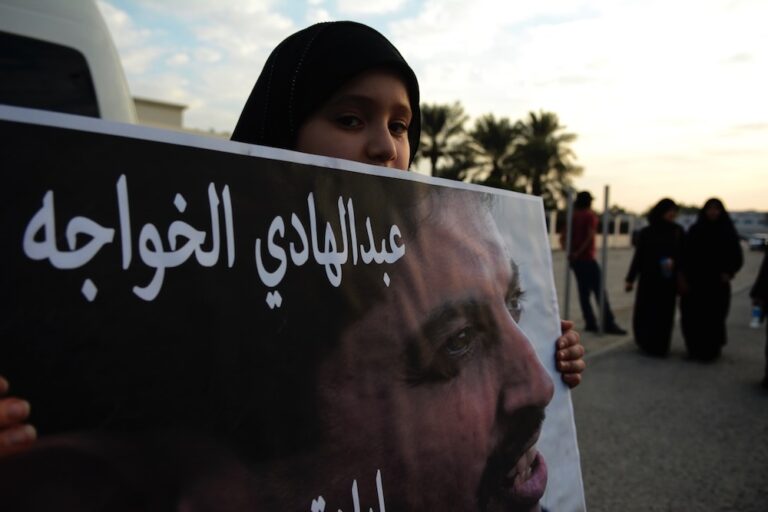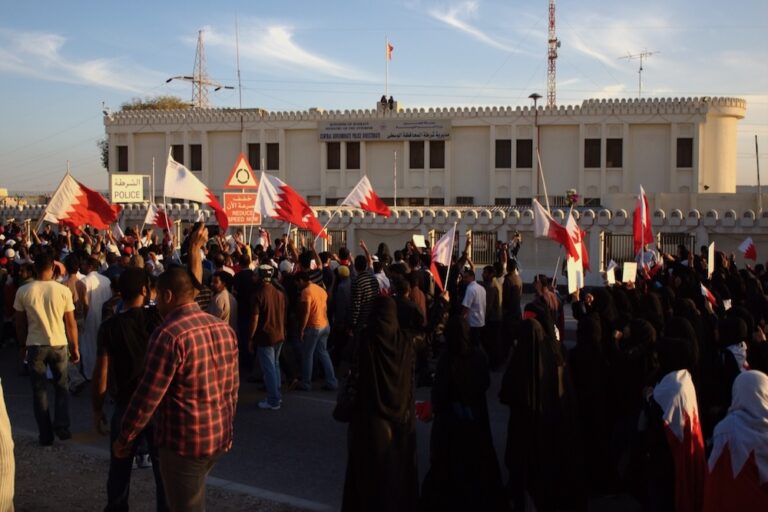The five policemen are accused of having beaten to death online journalist Zakariya Rashid Hassan AlAsheri and Ali Isa Saqer.
(BCHR/IFEX) – 13 January 2012 – The Bahrain Center for Human Rights (BCHR) expresses concern over the show trial of five police officers allegedly implicated in the torture and death of two detainees in custody in April 2011. The trial of the policemen accused of participating in the “beating” that led to the death of online journalist Zakariya Rashid Hassan AlAsheri (40 years old) and Ali Isa Saqer (31 years old) began on 11 January 2012, 8 months after the first announcement of their referral to court.
Many incidents of torture were reported in the months prior to the events of 14 February 2011 and continue to be reported, even after the release of the report of the Bahrain Independent Commission of Inquiry (BICI), which documented the Hasan Oun case for example. All these reports confirm the systematic nature and apparent policy regarding the use of torture in detention centers in Bahrain. The Bahraini government, however, continues to ignore calls from local and international organizations to hold any of the high-ranking officers accountable for the deaths of AlAsheri, Saqer and the other three men who have died under torture in custody. Instead it has resorted to bringing cases of torture against low-ranking policemen who, because of the systematic nature of torture in these institutions, if proven guilty, would have been following policy and not acting of their own account.
It is important to note that this case brought forward by the government does not include the huge number of documented cases of torture (1,866 cases that occurred within a period of 8 months only following the national safety status) and the similarity of torture techniques, including the use of electric shocks, which would not be possible without the availability of approved and budgeted devices at the detention centers. Through the hundreds of testimonies of abuse and torture that have been gathered, BCHR has collected the names of at least 50 security officials who were identified by victims as either carrying out the acts of torture directly or overseeing, authorizing or ordering them. Such a high number of torturers only confirms the existence of a policy of torture.
Instead of holding them accountable, the government of Bahrain has promoted several officials who are responsible for the occurrence of torture in the detention centers. Bahrain’s head of public security, Tariq bin Dinah, was dismissed from his position but then appointed as an Ambassador to the Cabinet of the Ministry of Foreign Affairs. The previous head of the national security apparatus, Sheikh Khalifa bin Abdullah Al-Khalifa, was promoted to General Secretary of the Supreme Council of Defense and King’s advisor with the rank of Minister. This is not the first time the government resorts to a rotation of torturers in security establishments to evade prosecution.
In addition, the circumstances surrounding the latest trial of five Pakistani policemen accused in the death of AlAsheri and Saqer are not promising. The five officers were referred to military court in May 2011 according to official press releases; however their trial has just been convened at a civil court as the military court (which has been busy reviewing hundreds of cases involving civilians) said the case does not fall under its jurisdiction. Two of the five men are accused of beating AlAsheri and Saqer severely enough to cause their death, while the other three are charged with failing to report the crime. The public prosecution has lessened the crime by describing it as “beating” rather than “torture”, thus denying the intention of both torture and killing. The penalty for beating that results in death can be a light sentence of 3-7 years’ imprisonment in the case of a conviction, compared to a life sentence in a case of torture. The accused policemen, who are not detained, have attended court in their uniforms, which indicates that they are still on duty and are not considered a threat to the rest of the detainees.
All five accused policemen are of Pakistani nationality. Bahrain’s police, military and national guard are staffed in large part by non-Bahraini citizens, mostly from Pakistan, Yemen and Syria. The use of mercenaries by security forces in Bahrain has been a longstanding topic of concern, as they are being used to suppress political dissent in the country, while at the same time Shia citizens are not allowed to serve in the security forces. Up to now, Bahrain has not signed the International Convention against the Recruitment, Use, Financing and Training of Mercenaries, 4 December 1989.
The general indication is that impunity is still being reigning under a show trial. The UN Human Rights High Commissioner mentioned in her last statement on Bahrain: “Such impunity – at all levels – is a serious impediment to national reconciliation.”
BACKGROUND:
Zakariya AlAsheri, moderator of the http://www.dair.net online forum, was arrested on 2 April 2011 on charges of inciting hatred, publishing false news, promoting sectarianism and calling for the overthrow of the regime via e-forums. He was announced dead in custody on 9 April 2011, and his body, which was covered with marks of torture, was handed to his family. At that time the government of Bahrain refused all reports of torture and alleged that he had died as a result of sickle cell anaemia complications.
Saqer turned himself in to the police on 5 April 2011 after several threats to his family. Four days later he was announced dead by the Ministry of Interior on 9 April 2011, while in police custody. The Ministry of Interior released a statement claiming that “the suspect created chaos at the detention center, prompting the security forces to intervene to bring the situation under control, but he resisted them sustaining injuries in the process. He was taken to the hospital and later died.” The minster of Human Rights herself alleged that detainees died of natural causes at a press conference and accused activists of fabricating photos of the torture marks. When BCHR president Nabeel Rajab published photos showing the torture marks on the body of Saqer, he was accused with fabricating photos and was summoned to the military prosecution.
Saqer had been arrested on charges of the attempted murder of police officers by trying to run over them in his car. Weeks after his death, Bahrain TV showed Saqer’s alleged “confessions” on 28 April 2011.
Click here for futher information and BCHR’s recommendations


